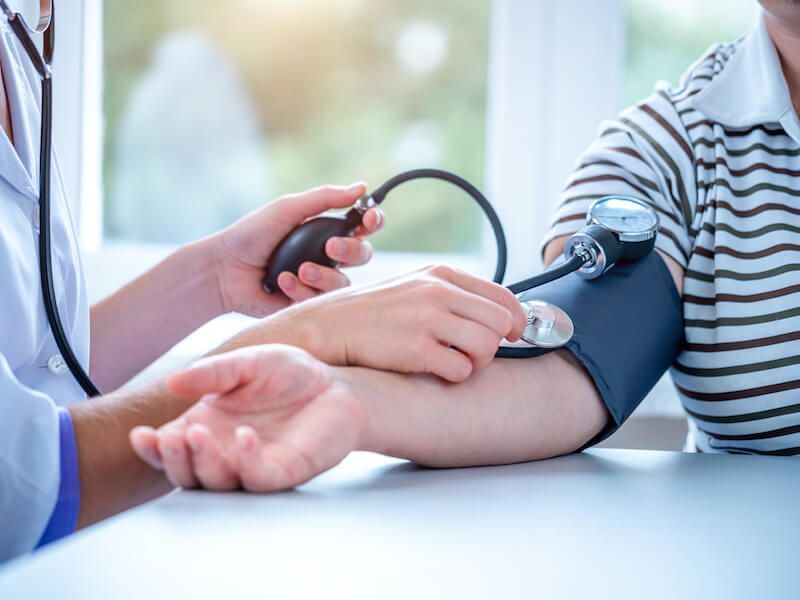Hypertension and Hearing Loss

Did you realize that high blood pressure can also increase your risk of developing age-related hearing loss?
From around 40 years old and up, you might start to detect that your hearing is beginning to fail. You most likely won’t even detect your progressing hearing loss even though it’s an irreversible condition. Years of noise damage is typically the cause. So how does hypertension cause hearing loss? The blood vessels in your ears and your blood vessels in general can be damaged by high blood pressure.
Blood pressure and why it’s so significant
Blood pressure is a measure of how rapidly blood moves through your circulatory system. High blood pressure means that this blood moves more quickly than normal. Over time, this can cause damage to your blood vessels. These damaged vessels grow less flexible and more prone to blockages. A blockage can contribute to a stroke or other cardiovascular issues. Healthcare professionals have a tendency to pay very close attention to a patient’s blood pressure because of this.
So, what is considered to be high blood pressure?
The basic ratings for blood pressure include the following:
- Normal: 120/8o
- Stage 1 Hypertension: 130-139/80-89
- Stage 2 Hypertension: 140 or Higher/90 or higher
When your blood pressure goes as high as 180/120, it’s regarded as a hypertensive emergency. This type of event should be addressed immediately.
How can hypertension cause hearing loss?
Hypertension can cause widespread damage to your blood vessels, including the blood vessels inside of your ear. Usually, the nerves in your ear will also be damaged along with these blood vessels. Likewise, high blood pressure can negatively affect the stereocilia in your ear (the tiny hairs responsible for picking up vibrations). These stereocilia are not capable of self-regeneration, so any damage they incur is permanent.
This means that damage to the ears, regardless of the cause, can cause irreversible hearing loss. Studies found that people with normal blood pressure readings tend to have a much lower prevalence of hearing loss. People who have hearing loss are more likely to have higher blood pressure. The impacts of hearing loss, in other words, can be decreased by keeping blood pressure under control.
What does high blood pressure make your ears feel like?
In the vast majority of cases, high blood pressure is a symptomless condition. High blood pressure isn’t the cause of “hot ears”. What are hot ears? It’s a symptom in which your ears feel warm and grow red. Normally, it’s a sign of changes in blood flow related to emotions, hormones, and other non-blood pressure-associated issues.
In some cases, high blood pressure can worsen tinnitus symptoms. But if your tinnitus was a result of high blood pressure, how would you know? It’s impossible to definitively tell without speaking to a doctor or hearing specialist. In general, however, tinnitus is not a symptom of high blood pressure. High blood pressure is sometimes referred to as “the silent killer” for a good reason.
Usually, it’s not until you get your vitals taken at your annual exam that high blood pressure is discovered. This is one good reason to be certain that you go to your yearly appointments.
How can you lower your blood pressure?
Typically, there are many factors that contribute to high blood pressure. As a result, you may have to take numerous different measures and use a variety of methods to effectively lower your blood pressure. In general, you should talk with your primary care doctor to lower your blood pressure. Here’s what that management might entail:
- Take medication as prescribed : In some instances, high blood pressure can’t be managed with diet and exercise alone. Although diet and exercise can be helpful, there are some situations where it will be necessary to use blood pressure medication as prescribed to manage hypertension.
- Avoid sodium : Keep your eye on the amount of sodium in your food, particularly processed foods. Find lower salt alternatives when you can (or avoid processed foods when you can).
- Get more exercise : Your blood pressure can be kept under control by getting regular exercise.
- Diet changes : Your blood pressure can be reduced by eating a Mediterranean diet. Eat more fruits and veggies and abstain from things like red meat.
A treatment plan to manage your blood pressure can be formulated by your primary care physician. Can hearing loss from high blood pressure be reversed? In some circumstances the answer is yes and in others not so much. You may be able to rejuvenate your hearing to some degree by lowering your blood pressure, according to some evidence. But it’s also likely that at least some of the damage incurred will be irreversible.
The sooner your high blood pressure is lowered, the more likely it will be that your hearing will get better.
Safeguarding your hearing
You can safeguard your hearing in other ways besides reducing your blood pressure. This could include:
- Talk to us : Any existing hearing loss can be maintained and early detection will be possible by getting routine hearing screenings.
- Avoiding loud venues and events : Try to avoid overly loud noises where you can, as these noises can lead to damage to your ears. If you absolutely need to be in a setting with overly loud noise, at least minimize your exposure time.
- Wear hearing protection : You can safeguard your hearing by using earplugs, earmuffs, or noise canceling headphones.
If you have high blood pressure and are noticing symptoms of hearing loss, be certain to make an appointment with us so we can help you address your hearing loss and protect your hearing health.


